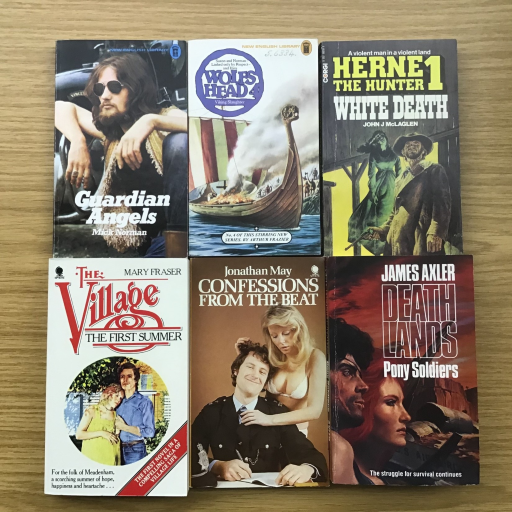The National Library of Scotland is a Legal Deposit library, which means we build our collections by requesting a copy of every book published in the UK and Ireland. Thanks to Legal Deposit the Library is home to probably the largest collection of popular fiction in Scotland. If you are interested in crime, romance, westerns, science fiction, thrillers, horror, fantasy or historical fiction you will find it on our shelves.
Laurence James (1943-2000) was a prolific author of popular paperbacks from the 1970s to the 1990s. He wrote between 165 and 200 novels (the number varies in different accounts, and no one seems quite sure) under at least 20 different names in almost every genre, writing up to 14 books a year. His books are estimated to have sold 12 million copies.
James was a key figure in the paperback boom of the 1970s, working initially as an editor and then as an author for the publisher New English Library. The company published some of the most acclaimed and bestselling science fiction books of the period such as Frank Herbert’s “Dune” and international bestsellers including Harold Robbins. The core of the New English Library list though was books commissioned from freelance writers which were short (around 160 pages), invariably violent and inspired by trends in culture or society and issued as inexpensive paperbacks. New English Library would identify a subject such as Hell’s Angels, glam rock, spaghetti westerns or police corruption that might be of interest to what was a mainly young male readership and commission a book based on it. If the book was a success they would flood the market with similar titles, if a failure it would quietly disappear.
James was initially an editor but grew tired of chasing up authors for books they had committed to write but failed to deliver. Deadlines and word counts were missed, and the authors were often eccentric, erratic and difficult to deal with, fueled by pills and alcohol. James quit his editorial post and became a freelance writer for New English Library and other publishers. He knew exactly what editors wanted. A manuscript that met the brief, hit the word count and arrived on time and needed the minimum of revision. Sales and feedback from readers was good and James was an editor’s dream, so commissions rolled in.
James would write whatever the market demanded. As Mick Norman he wrote four novels featuring Hell’s Angels as Jonathan May twelve comic novels. As James W. Marvin, L.J. Coburn, William M. James, John J. MacLaglen and Charles C. Garrett he wrote around fifty westerns, sometimes in collaboration with other writers. As Klaus Netzen he wrote World War II novels and as Andrew Quiller and Neil Langholm historical novels about ancient Rome and Vikings.
By the late 1970s and 1980s the publishing world and readers had moved on. Early computer games and the development of the video cassette expanded the options for home entertainment and dented the popularity of the type of books James had been writing. In response he turned to newly popular genres writing horror fiction as Richard Haigh and James Darke and even turning his hand to romantic fiction as Mary Fraser. He collaborated with his son Matthew on books for children in the late 1980s and early 1990s. His reputation led to be him being signed up to write the “Darklands” series of post-apocalyptic science fiction novels under the pen-name James Axler for a North American publisher. He would write over thirty books in the series until cancer forced him in give up writing in the mid-1990s. James was planning a return to writing when he lost his long battle with cancer in 2000.
Almost all of James’s books are out of print but much of his output is available to read at the Library. Which is just as well as his books, especially the ones he wrote for New English Library, have been rediscovered since his death. In the 1970s most of his readers would have been unaware they were reading a book by James. Apart from a few science fiction novels he rarely published under his own name and the books did not mention him. Whilst no one pretends his work is great literature he has retrospectively became admired for his tight plotting, economic prose and pacey style. Fan forums and blogs identify the books he published under his many pseudonyms, and he has a growing number of admiring readers. His books once forgotten charity shop staples are now collectable. The books are also of growing academic interest as popular fiction has become an area of study.
James is just one of many British writers who contributed to a lost era of popular fiction. He was one of the seven Piccadilly cowboys who between them wrote several hundred westerns in the 1970s and 1980s. The cowboys were Terry Harknett, Angus Wells, Kenneth Bulmer, Mike Linaker, Laurence James, Fred Nolan and John Harvey who published under a bewildering range of pen names. John Harvey would later find success under his own name with the acclaimed Charlie Resnick crime novels but the rest of the seven toiled largely anonymously like James, publishing in a variety of genres under many names. We salute them and are pleased to provide a permanent home for much of what they published, which has otherwise largely disappeared from libraries, bookshops and archives.
James is featured in the Library’s exhibition Pen Names which explores a range of writers working in Britain from the 1800s to the present day who use pen names. The exhibition runs from 8 July 2022 to 29 April. Learn more about Pen Names on our website. For more blog posts about authors who use aliases search #PenNamesNLS.
